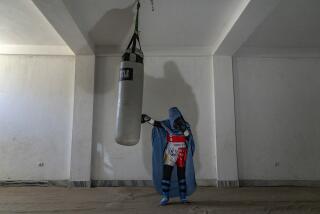Smuggling Is Afghans’ Lifeblood
- Share via
NAWABHAD, Afghanistan — To find the profit in war, follow the smugglers and watch the men moving refugees and goods across the treacherous front line north of the capital, Kabul, make a killing.
Abdul Wakil packed 25 people into his battered Japanese pickup and sneaked them past Taliban lines in the dead of night to reach the relative safety of opposition-controlled territory Thursday afternoon.
He didn’t take the risk of getting shot or locked up in a Taliban jail out of the goodness of his heart. Wakil charged 10 adults $25 apiece--all the money that most had left--to smuggle them out. He let the children ride for free.
The midnight run along a well-established smuggling route on winding mountain tracks cost Wakil nothing more than a tank of diesel and some extra wear on already bald tires. The $250 he pocketed for less than two days’ work was almost pure profit--and more than three times an Afghan doctor’s monthly salary.
Farooq Rashid, 30, was crammed into the bed of Wakil’s pickup truck with his 2-year-old daughter, Lina, and his father, Abdul, a man of 70 with a long white beard and tired eyes.
The family patriarch has little left to live for now. He sold the family’s house in Kabul to pay Wakil, so they will have nowhere to return when, or if, Afghanistan’s agony of war ever ends.
“Everyone is leaving Kabul because of the American bombing,” Rashid said as he squeezed into a truck so overloaded that even the tail was down and loaded with people and sacks of flour.
Aman Hulla, who escaped across the front line riding atop a stack of cartons about 6 feet high in the bed of the pickup, teetering precariously the whole time, said he fled because looters have been on the rampage in Kabul since at least Monday, and food stocks are running out.
Hulla, 65, pulled a folded piece of stale flat bread from his dusty jacket pocket and said it was all he and two companions had survived on for the preceding three days.
Most of his relatives left Kabul before him, Hulla said, and the others will follow just as soon as they can scrape up enough money.
“Just the poor are left in Kabul now,” he said. “They are like people who are already dead. They don’t know why the airplanes are bombing everywhere, and there is nothing for them to eat.
“They are going to sell their houses and shops, their clothes--anything else that they can to earn the money to get out.”
At the wheel of his rattling pickup, Wakil offered no apologies for taking desperate people’s money. He was in a hurry, he said, to move on and unload his cargo, and make a quick turnaround back across the front line.
The United Nations has accused Taliban soldiers of demanding money from people fleeing Kabul. But the refugees interviewed after crossing the front line Thursday, most of whom belonged to the ethnic Tajik minority, said they didn’t pay anything to the Taliban to escape.
They had to meet Wakil’s price, the refugees said, because smugglers have the only vehicles heading into territory controlled by the opposition Northern Alliance, which is dominated by ethnic Tajiks, Uzbeks and other Afghan minorities.
After more than two decades of war, Afghanistan’s economy is in such a mess that smuggling is not only one of the few ways left to make a decent living, it is the very foundation of trade and commerce.
Last year, when all but 5% of Afghanistan was under Taliban control, and TV, video players and cassettes were banned by the extremist Islamic regime as the work of infidels, the country imported an unusually large amount of home entertainment equipment.
A joint U.N. Development Program and World Bank study found that Afghanistan imported about $1.2 billion in foreign luxury goods last year, including clothes, electronics and ladies’ cosmetics, which is odd considering that the Taliban forces all women to drape themselves from head to foot in burkas.
An estimated $942 million of the imports were quickly shipped back out of the country, according to the study published in June. Most made a full circle into neighboring Pakistan, where they ended up on the black market--duty free.
North of Kabul, the bazaars in areas controlled by the Northern Alliance are stocked full of contraband goods brought in under the noses of their Taliban enemies and trucked across the front line.
There are luxury items such as Imperial Leather soap, Head & Shoulders dandruff shampoo and Chinese-made Horsehead brand toilet paper alongside necessities such as imported sweaters, shoes and Chinese-made underwear.
The goods come strapped to the backs of horses and donkeys, or piled high from the beds of pickup trucks that rock from side to side as they creep over deep ruts in the road that cuts through the wild frontier, about 20 miles north of Kabul.
Mohammed Zilgai, who’s been a smuggler since he was 16, crossed the front line Thursday with a pickup full of about 375 pounds of goods he bought in the bazaars of Kabul, including cases of Pepsi and cartons of sandals and socks.
It was a treasure that Zilgai, now 18, risked his life to deliver to shop owners in Northern Alliance bazaars, for a profit of no more than $25, the fare he could charge for a single Kabul refugee.
Three months ago, the Taliban caught Zilgai and threw him in a prison cell, where he slept on the bare floor with about 25 other men, he said.
“They fed us each a piece of bread three times a day, with water,” Zilgai said. “They beat us with a stick this big,” he added, pressing his thumbs and fingers together to form a circle as large as a small tree trunk.
That wasn’t the worst of it: The Taliban also confiscated his cargo, which set him back about $625, an amount that will take him weeks to make up. Zilgai’s Taliban jailers released him after a week and issued a stern warning: “They told me, ‘Don’t come this way again, or we will kill you,’ ” he said.
He ignored the Taliban and listened to his buyers instead.
“If smugglers didn’t bring these things in, the shops would have nothing to sell,” Zilgai said. “From 70% to 80% of the goods here come from Kabul.”
Although every other truck that came north from Kabul on Thursday had at least a few refugees on board, Zilgai insisted that the eight men and boys sitting on his stacks of boxes were part of his team and relatives, not paying passengers.
One of them, an elderly man, was carefully holding two small fluorescent-light tubes wrapped in the cardboard of a chewing gum carton, trying to make sure the glass didn’t shatter along the bumpy road.
Zilgai fled Kabul four years ago, less than a year after the Taliban seized the capital, and he would never charge anyone trying to get out now, he claimed.
But Zilgai said he wasn’t trying to make himself out to be any better than anybody else.
“Anyone who can get food for his family now--he’s a hero,” he said.
More to Read
Inside the business of entertainment
The Wide Shot brings you news, analysis and insights on everything from streaming wars to production — and what it all means for the future.
You may occasionally receive promotional content from the Los Angeles Times.










